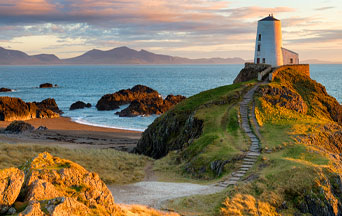
In the nineteenth century, Catholicism developed extensively throughout Europe, recovering from decades of revolution. Catholic movements grew and prospered despite many difficulties ranging from the inertia and self-indulgence of many to the threats and plotting of opponents. These movements promoted a splendid revival of Catholic religious life even in Protestant countries.
In the British Isles, the profound difference in mentality between Irish and English Catholics constituted a serious obstacle to the progress of the Faith. The Irish vigorously resisted Protestant persecution and preserved Saint Patrick’s legacy intact. At the same time, the English faithful saw their ranks dwindle as they passively accepted the pariah status that Anglicans imposed on them.
Thus, almost all of Ireland remained deeply Catholic as the nineteenth century began. They were dispossessed of their lands and subjected to heavy taxes to support foreign authorities—including Protestant bishops. All the while, the Irish contributed generously to ensure their numerous and poor Catholic clergy would not lack support. Nothing could overcome their ardent desire to fight in defense of the true Church. They were intransigent, willing to make great sacrifices, and always looking for an opportunity to shake off the Protestant yoke.
Meanwhile, English Catholics were accommodating, despite suffering the same injustices. Their restraint did not earn them their opponents’ respect. English Catholics still lived in hiding, in perpetual dread of heretic informers, and seemed incapable of reacting even if success seemed assured.
Eternal and Natural Law: The Foundation of Morals and Law
As the nineteenth century dawned, England was a mission country, divided into five apostolic vicariates. Cardinal Herbert Vaughan said English Catholics “looked like the wreckage of a ship that sank after a violent storm.” John Henry Newman called them “a mere handful of individuals one could count as stones or remnants of a great flood. They were found only in secluded places, alleys, cellars, mansards, or remote fields and completely separated from the crowd. They were glimpsed in darkness, fog or twilight, like ghosts fleeing here and there from the arrogant Protestants, lords of the land.”
When Napoleon tried to overthrow England through a continental blockade, the pope forbade the embargo to apply to the Papal States. As a sign of gratitude, the British government suspended some restrictions that banned Catholics from entering certain professions. This show of benevolence did not deceive the Irish. They soon promoted a revolt, which England promptly crushed. The Irish national parliament was closed, and the country was incorporated into the United Kingdom.
To weaken the Irish nationalists, Prime Minister William Pitt sought to separate the Catholic cause from Irish nationalism. To this end, he promised a so-called Emancipation Bill to restore limited freedom to the Church in the United Kingdom.
The cabinet set three conditions for the emancipation of the detested “papists”: the need for the Crown to approve the publication of papal documents, a government veto for nominations of bishops, and the requirement that Catholics make an oath of allegiance to the government.
The English Catholics saw the proposal as a real gift, far greater than they dared hope for. Under Bishop William Poynter’s leadership, they were ready to accept the government’s conditions. The Irish, however, closed ranks around Bishop John Milner and Daniel O’Connell, who demanded that the bill not contain any restrictions.
 Learn All About the Prophecies of Our Lady of Good Success About Our Times
Learn All About the Prophecies of Our Lady of Good Success About Our Times
Daniel O’Connell was a young lawyer who graduated as soon as the Crown allowed Irish Catholics to practice the liberal professions. He soon made a name for himself in Dublin, defending his compatriots’ causes against the government.
From 1800 to 1809, the two divergent currents tried to convince Rome about the Emancipation Bill. Meanwhile, Daniel O’Connell started his famous liberation movement in Ireland. He was a great orator whose success in public meetings was unparalleled. Little by little, the Irish gathered under his direction and established the “Catholic Association.”
Its meetings were immediately closed by the police and soon reopened under other names. O’Connell often reminded people, “we must speak out and associate not just today and tomorrow. We must always speak out, associate, write and petition until our goal is met and justice is served. We must weary the patience of injustice and force the hand of Providence.” So the Irish organized, spoke out, wrote, petitioned, and forced the English government to delay the passage of the Emancipation Bill.
With the fall of Napoleon, England believed it was strong enough to impose its will on the Church. Pius VII faced enormous difficulties, not only to impose order in the Papal States (from which he was forced to withdraw for a long time) but also to restore Catholicism in various parts of the world hard hit by the Revolution, the war, and the pope’s captivity.
Science Confirms: Angels Took the House of Our Lady of Nazareth to Loreto
In 1814, the Prefect of the Congregation for the Propagation of the Faith, Giovanni Battista Cardinal Quarantotti, accepted most of Parliament’s conditions for emancipation. The Cardinal was supported by Father Paul MacPherson, Rector of the Scottish College in Rome.
English Catholics welcomed Cardinal Quarantotti’s document enthusiastically. Among the Irish, however, the consternation was general. They could not believe that the pope had accepted the cabinet’s conditions and immediately sent a mission to Rome. It turned out that Cardinal Quarantotti had published his acceptance without submitting it to the pontiff. The controversy about the draft bill soon flared up again, and the English government again prudently postponed its approval.
Photo Credit: © Helen Hotson – stock.adobe.com

